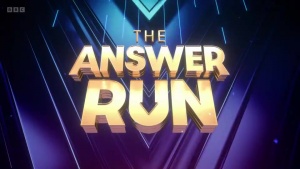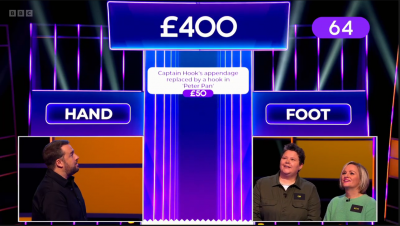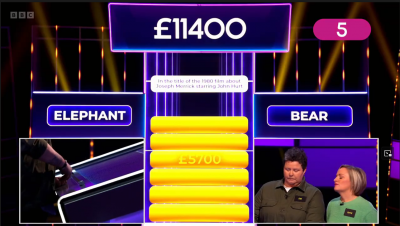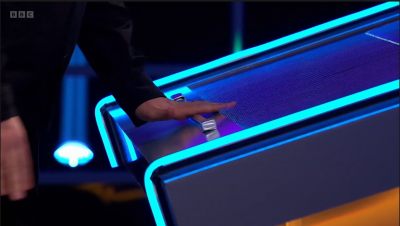The Answer Run
Synopsis
Daytime quizzer with Jason Manford; swipe left or right to match a statement with its category.
Three pairs play in each standalone episode. There's a one-question buzzer race to decide who plays first.
First couple pick one of three category pairs (in the opening episode: Won-Lost, The Smurfs-Rolling Stones, Peter-Paul).
A statement appears and travels down the screen, and the team have until it reaches the bottom to place it into the correct category. Once upon a time, this might have been done with giant slammable buttons or a big lever to push from side to side, but here it's done by swiping one's hand across a bar, which may be more 21st-century but feels like maybe we've lost something visually. Each statement has a value from £50 to £500; right answers add to the bank, wrong answers deduct from it, and the bank cannot fall below zero.
Up to 15 questions or 90 seconds in the round. After the first team have played, there's another buzzer question to decide who plays next, and the last team has no choice of category.
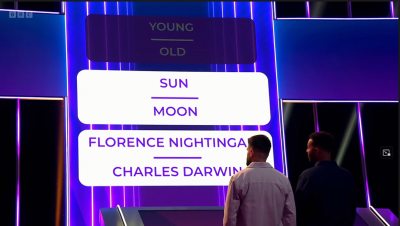 The second team to play pick their category. "Young / Old" has already gone so they have the remaining two to choose from
The second team to play pick their category. "Young / Old" has already gone so they have the remaining two to choose fromSecond round is almost exactly the same as the first. One change: the statements change in value, alternating from £200 to £400 (for example) and back again, the higher value always twice the lower; the players see when the value changes. Questions here are worth up to £1000.
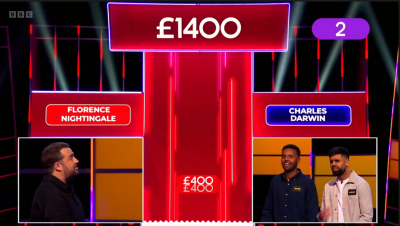 Which of these is buried in Westminster Abbey? The SCARY RED LIGHTING tells us that it's not Florence Nightingale
Which of these is buried in Westminster Abbey? The SCARY RED LIGHTING tells us that it's not Florence NightingaleLowest score after the second round leaves the show.
Final round alternates between the two remaining couples, with a buzzer question to play first. As soon as the first team give an incorrect answer, the clock will stop and the other couple take over; when they err, the first couple return. Up to 15 questions or 120 seconds in this round, question values again double and halve, with questions worth up to £2000.
Highest score when the round ends is the winner.
To claim their jackpot, the players must get eight right in a row. There's a nifty effect to build bars of gold; if the statement hits the top bar, it's treated as wrong. Having at least four bars lit at the end of the round will earn half the jackpot (it's not enough to have reached four bars earlier in the round - you must have them lit when the clock hits zero). We're going to make an educated guess that the producers underestimated how much people would play for (jackpots regularly exceed £10,000) as they failed to code a comma on the big display - even though commas are used for the numbers on the contestant podia. Work that one out if you can.
There's enough quiz to keep anyone going: about 100 questions in the 42 minutes, though they're displayed in teeny-tiny print - even some of us with a decently large screen and 20/20 vision find ourselves having to lean forward at times, and if they cut away to a side angle, forget it. Some of the show seems to have been made with an eye to internet memes - the opening episode saw a contestant play the recorder with her nose. Returning to the game, the jackpot feels like it'll be won a bit less than once a week (in the first series, it was won six times in five weeks, so not quite that bad, but still rather on the low side), and the smaller prize actually feels quite difficult to win. It feels unnecessarily harsh to have a team reach the low win only to have it snatched away, and we would suggest the low win ought to be safe once achieved - even if that means moving it up to five or even six correct answers (how about one quarter of the prize fund for four, and half for six? A quarter-half-full payment structure was employed on Mansford's last show Unbeatable, so we know viewers can cope with that just fine).
Jason Manford brings a lot to the show, and success for The Answer Run may depend on how the audience feels about him.
Inventor
James Allison, Elliot Johnson, Dylan Todd, Amanda Wilson
Theme music
Paul Farrer
Trivia
Jason promoted the new series with a surprising claim: that the prizes were not huge. He told the TV Times,
- "Because the prize money isn’t life-changing, everyone's a bit more relaxed. Because it's not the sort of money where you could buy a new house or give up your job, everyone was more willing to take a risk and that makes for better telly."
Citation needed, wethinks.
Web links
Pictures
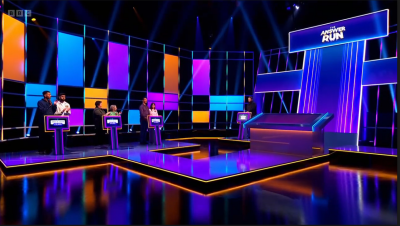 A wider shot of the studio. Evidently they didn't budget for enough coloured panels but they managed to style it out....
A wider shot of the studio. Evidently they didn't budget for enough coloured panels but they managed to style it out....
